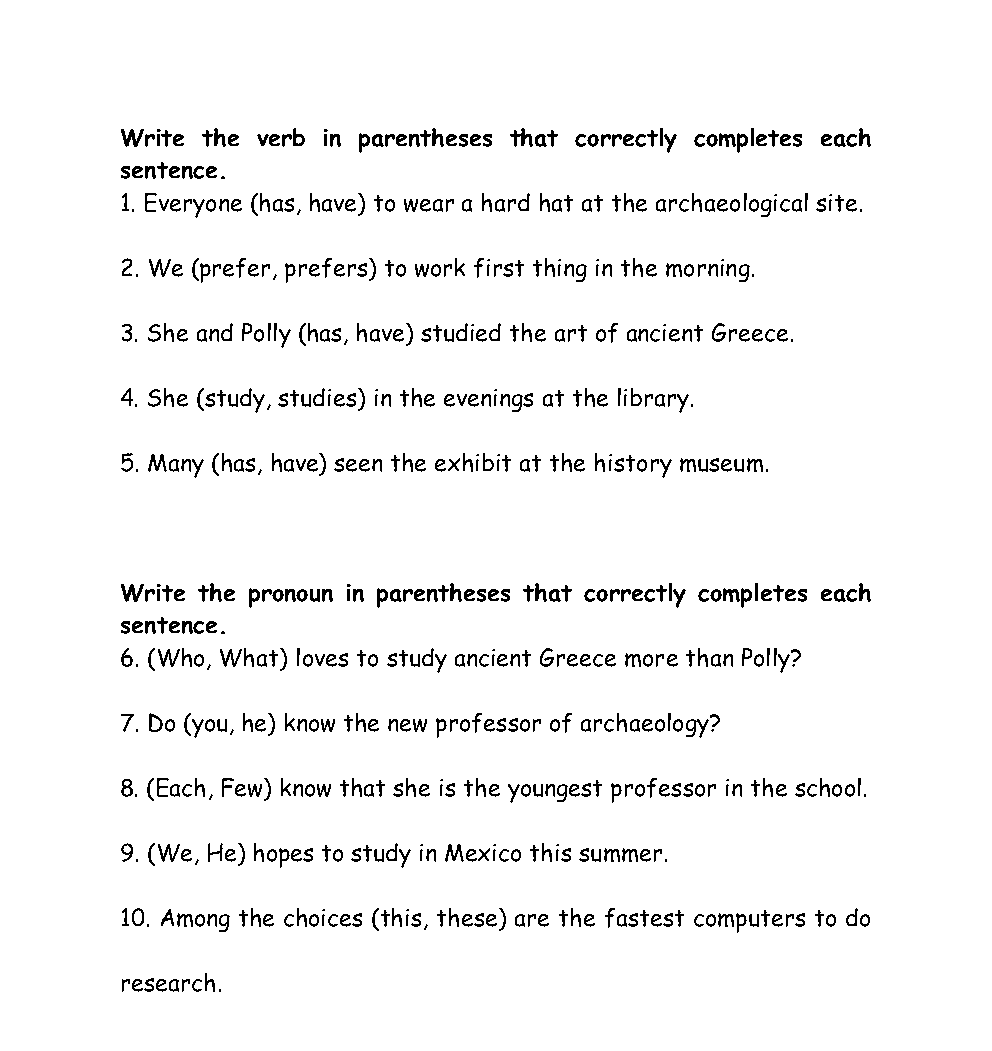Pronoun-Verb Agreement - 6th Grade Grammar
Introduction
Pronouns and verbs are like peas and carrots - they go together! Getting your pronouns to play nice with verbs is a must for 6th-grade grammar success.
Let's start with a pop quiz: Fill in the blank with the correct verb:
- She ________ a talented soccer player. (is/are)
You got it right if you chose "is"! The pronoun "she" is singular, so it needs the singular verb "is".
Now it's your turn - help me fix this sentence:
- They_______ happily raising their hands. (is/are)
Great job! You picked the plural verb "are" to match the plural pronoun "students".
Pronoun-Verb Agreement
Subject pronouns and verbs must agree.
I am tired.
She is sleepy.
She and I are exhausted.
Add -s to regular present-tense verbs when you use the singular pronouns he, she, and it.
She walks her dog every morning.
He sleds down the hill.
Jack thinks it looks like a good day for kickball.
He says he will organize a game.
She kicks the ball harder than the other players do.
Do not add -s to regular present-tense verbs when you use the pronouns I, we, you, and they.
I visit my grandmother every Sunday.
We swim in Lake Hopatcong.
We play on the corner near Claire’s house.
I want to be on Claire’s team.
You need to join our team! to play.
An indefinite pronoun does not refer to a specific person, place, or thing.
Some indefinite pronouns are singular, such as anyone and everyone.
Anyone in the neighborhood knows where Claire lives.
Today, everyone agrees to play after lunch.
Others are plural, such as both and several.
Two teams will play; both hope to win.
Some can be plural or singular, such as all and some.
All of the ice is melted.
All of the players feel ready to play.
Some of the baseball players are happy as spring is here.
Subject Pronoun-Verb Contractions
A contraction is a shortened form of two words in which the missing letters are replaced by an apostrophe.
They are leaving tomorrow.
They’re leaving tomorrow.
Subject pronouns can be combined with some verbs to form contractions.
| I am | I’m |
| we are | we’re |
| he is | he’s |
| they are | they’re |
| it is | it’s |
| you will | you’ll |
| I have | I’ve |
| she has | she’s |
| they have | they’ve |
| we will | we’ll |
<->
Pronoun-Verb Agreement Activity - 6th Grade Grammar
From 1-3, each sentence has an error in pronoun-verb agreement. Read the sentence in each item. Select the choice of the change that corrects the sentence.
From 4-5, For each item, select the choice that best answers the question.
Pronoun-Verb Agreement Worksheet - 6th Grade Grammar
FAQS
What is the verb agreement for pronouns?
Pronoun-verb agreement in English means matching the verb to the pronoun's number - whether singular or plural. For example, the pronoun "she" is singular, so the verb must also be singular: "She walks." The pronoun "they" is plural, so the verb must be plural: "They walk." Getting the verb to agree prevents awkward sentences like "She walk". Worksheets and class practice exercises will help you enhance your language skills.
What is pronoun agreement in 6th grade?
In 6th grade, students learn the basics of pronoun-verb agreement. The rules are: A singular pronoun takes a singular verb, while a plural pronoun takes a plural verb. Examples: I am, he walks, she eats. They swim, we play, you run. Mastering this concept allows 6th graders to construct smooth, grammatically correct sentences, especially in writing.
What is a pronoun agreement and examples?
Pronoun agreement means the pronoun and verb match in number - either both singular or both plural. For example,
- She is (singular pronoun + singular verb)
- They are (plural pronoun + plural verb)
- It laughs (singular)
- We think (plural)
Getting the agreement right produces natural-sounding sentences, while a mismatch sounds awkward.
What are the 10 rules of verb agreement?
Here are 10 key rules of subject-verb agreement in English grammar for grade 6:
- A singular subject takes a singular verb.
- A plural subject takes a plural verb.
- Collective nouns can take a singular or plural verb depending on context.
- Two singular subjects connected with "and" take a plural verb.
- Compound subjects with "or" take the verb that matches the nearest subject.
- With "either/or" and "neither/nor", the verb agrees with the nearest subject.
- Words like "each", "many a", and "everyone" take singular verbs.
- With fractions and percentages, look at the noun before the preposition.
- In questions, the verb matches the subject, not the question word.
- Watch out for distracting phrases between subject and verb.


